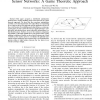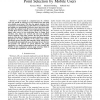20 search results - page 3 / 4 » Model Checking Nash Equilibria in MAD Distributed Systems |
GLOBECOM
2006
IEEE
13 years 11 months ago
2006
IEEE
— This paper proposes a distributed optimization framework for wireless multihop sensor networks base on a game theoretic approach. We show that the cross-layer optimization prob...
MOBICOM
2006
ACM
13 years 11 months ago
2006
ACM
We propose novel solutions for unicast routing in wireless networks consisted of selfish terminals: in order to alleviate the inevitable over-payment problem (and thus economic i...
ATAL
2008
Springer
13 years 7 months ago
2008
Springer
Future agent applications will increasingly represent human users autonomously or semi-autonomously in strategic interactions with similar entities. Hence, there is a growing need...
CCS
2009
ACM
14 years 17 days ago
2009
ACM
In mobile networks, authentication is a required primitive of the majority of security protocols. However, an adversary can track the location of mobile nodes by monitoring pseudo...
COMCOM
2008
13 years 5 months ago
2008
A user located in a congested area of a wireless LAN may benefit by moving to a less-crowded area and using a less-loaded access point. This idea has gained attention from research...


